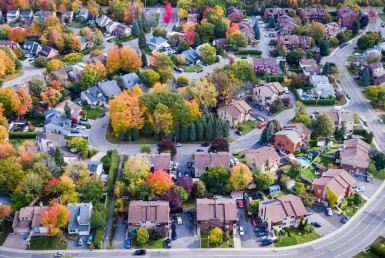Housing Market Predictions: Real Estate Forecast 2023

Housing Market Predictions: Real Estate Forecast 2023
By Marco Santarelli
Housing Market Predictions & Forecast
Experts are divided into the housing market predictions and forecasts for 2023. While there is no consensus on whether the historically tight housing market will loosen or not, the market has cooled significantly from its previous highs. Despite predictions of a housing market crash comparable to the Great Depression due to the pandemic, the market has remained stable. However, home prices are forecasted to continue rising at a slower rate, while home sales may continue to decline due to supply-demand imbalances.
While higher mortgage rates and recession fears have cooled the market from its spring highs, other factors may impact the market’s pace and favorability for buyers or sellers. The market is shifting away from sellers to more balanced conditions. Buyers remain interested, keeping the market somewhat competitive, especially for attractive, well-priced homes.
The positive outlook is that most real estate firms do not predict a financial or foreclosure crisis on the scale of 2008, but they do expect housing fundamentals to return to the mean. Some of that moderation will be brought about by growing salaries, while some will be brought about by declining home prices. The housing market won’t be overvalued after this correction is over.
ALSO READ: Real Estate Housing Market Trends for February 2023
The direction of mortgage rates in 2023 is likely to affect the decline in home values. Interest rates have a significant impact on the real estate market, as they influence mortgage payments, demand for housing, and housing prices. While home prices are still on the rise, the rate of growth has slowed down from earlier in the year. Despite this, buyers remain interested in the market, resulting in a somewhat competitive market, especially for well-priced and attractive homes.
However, there are still many concerns regarding the housing market, particularly regarding the shortage of supply and rising interest rates. The shortage of supply has been one of the main drivers of home price growth, but rising interest rates are discouraging potential sellers and new construction. This means that there is little hope for improvement in the housing supply and a sustainable housing market that would result from an increase in inventory.
The significant increase in mortgage rates since last year has made the already expensive housing market even less affordable. Home prices experienced a meteoric rise during the pandemic due to factors such as high demand, low supply, and record-low mortgage rates. However, the sudden increase in mortgage rates has dampened the market’s growth and affordability, making it difficult for buyers to enter the market. Let us continue to find out about the latest housing market predictions and forecasts.
Housing Market Predictions: What Experts Are Projecting for 2023?
There is little consensus among economists, mortgage firms, banks, and real estate firms regarding whether the historically tight U.S. housing market will reverse course in 2023. It appears that the US housing market is likely to experience a decline in home prices in 2023. However, the severity of this decline will likely depend on various factors, including the extent of the housing supply shortage, economic conditions, and location-specific factors. Let’s take a detailed look at some of the notable predictions made by top companies in the industry.
According to Fannie Mae, it appears that the U.S. housing market will continue to struggle in 2023. The organization expects both new and existing home sales volumes to drop by 5.4% and 19.2%, respectively, after significant drops in 2022. This will likely occur due to high mortgage rates, which Fannie Mae believes will continue to deter potential buyers. Furthermore, the number of available homes on the market will remain low, as most homeowners with low fixed mortgage rates will not want to trade them in for higher rates, thereby limiting inventory levels.
Fannie Mae also expects home prices to continue to decline in 2023 and 2024. Following a 2.5% drop in the second half of 2022, the organization predicts a further 4.2% decline in 2023 and a 2.3% decline in 2024. However, this correction is considered mild, as national home prices are still projected to be up 29% by the end of 2024 compared to March 2020 levels. It is important to note that regional variations may occur in price movements despite national price trends.
According to the National Association of Realtors (NAR), home prices are expected to increase by 1.2% this year. This projection indicates a continued upward trend in the housing market. Additionally, NAR predicts that mortgage rates will plateau at about 6.4%.
Goldman Sachs and Wells Fargo have both recently made forecasts for the US housing market in 2023, and their predictions suggest a decline in home prices. Goldman Sachs is forecasting a more significant drop, with a projected decline of 7.6% from the peak, while Wells Fargo predicts a more modest decrease of 5.5%. Both banks attribute the anticipated drop to the current housing supply shortage, which has been a persistent issue in recent years.
It’s worth noting that Wells Fargo also highlighted that there may be significant discrepancies in the extent of the price fluctuations depending on the desirability of a particular location. This could mean that some areas may experience larger price drops than others, depending on factors such as local economic conditions, population growth, and housing supply and demand dynamics.
The accounting firm KPMG LLP’s forecast for the housing market in 2023 looks bleak. Existing home sales are predicted to drop by 23% from 2022, which would be a decrease not seen since 2007. The drop is expected to be driven by single-family home sales due to the limited supply and high prices. However, condos are predicted to fare better.
The number of purchase applications has dropped by over 40% from a year ago in February. Buyers are betting on rate cuts by the Fed as their mortgages reset in 2024, and they are using adjustable-rate mortgages (ARMs) to get into the few homes that are listed. Despite the spike in rates and erosion in affordability, millennials still make up over half of the purchase applications.
The share of those who have locked into ultra-low rates or paid off their mortgages has surged. Those homeowners have a natural hedge against escalating shelter costs and some have chosen to rent out their homes to cash in on the demand for single-family rentals, further constraining the stock of homes.
Home prices are predicted to fall between 7% and 10% depending on the measure, with the S&P CoreLogic Case-Shiller Home Price Index expected to drop another 8% in 2023, bringing prices to the still elevated levels of late 2021. Despite the rise in demand for rentals, rents have fallen more rapidly than home prices, and the Fed is counting on those declines to cool inflation. However, the tight labor market may place a floor under how much rents fall in the hottest markets, hence the Fed’s focus on the labor market.
According to Freddie Mac’s first-quarter housing outlook pulse survey of 2023, market confidence in the housing market has rebounded somewhat quarter-over-quarter, despite payment concerns remaining unchanged among both homeowners and renters. Specifically, 43% of respondents are confident the housing market will remain strong over the next year, up 9 percentage points from last quarter but down 15 percentage points compared to last year.
However, concerns about housing affordability persist, with 59% of renters and 28% of homeowners spending more than 30% of their monthly income on housing. Additionally, over half of the respondents (54%) expressed concerns about making housing payments, with 70% of renters and 44% of homeowners feeling this way.
In terms of market activity, only 18% of respondents indicated they are likely to buy a home in the next six months, while 14% of homeowners say they are likely to sell in the same period. About 16% of homeowners plan to refinance in the next six months. Overall, while market confidence has rebounded somewhat, concerns over housing affordability and payment continue to persist.
According to the CoreLogic Home Price Insights report, national home prices increased year-over-year by 5.5% in January 2023 compared with January 2022. However, on a month-over-month basis, home prices declined by 0.2% in January 2023 compared with December 2022. The CoreLogic HPI Forecast suggests that home prices will decrease on a month-over-month basis by 0.1% from January 2023 to February 2023 and increase on a year-over-year basis by 3.1% from January 2023 to January 2024.
While some states like Idaho, Montana, Washington, and Washington, D.C. saw annual declines in home prices, other states like Florida, Maine, and South Carolina saw significant year-over-year increases. Miami, in particular, experienced the highest increase in home prices at 17.3% year over year.
The CoreLogic Market Risk Indicator (MRI) predicts that Bellingham, WA is at a very high risk of a decline in home prices over the next 12 months, along with other cities like Bremerton-Silverdale, WA; Crestview-Fort Walton Beach-Destin, FL; Salem, OR; and Tacoma-Lakewood, WA.
Overall, while their national housing market may experience a slight decline in the short term, the forecast suggests that it will pick up again in the long run, with some states and cities continuing to experience significant growth. However, some areas face a risk of a decline in home prices in the next year.
Freddie Mac’s Economic & Housing Research Group in its latest forecast to date has predicted mortgage rates dropping from an average of 6.8% in the fourth quarter of 2022 to 6.2% in the fourth quarter of 2023. The government-sponsored enterprise forecasts that home sales activity will bottom at around 5 million units at the end of 2023. Falling from 7 million to 5 million would be a decline of about 30% and put the contraction in home sales in line with other historical periods when interest rates increased.
As housing market activity continues to contract, Freddie Mac expects that it will lead to a continued increase in the months’ supply of homes available for sale from historically low levels last year. The loosening of the once incredibly tight for-sale inventory removes the intense upward pressure on home prices of the past two years. While fewer sales are increasing the months’ supply, that is partially offset by fewer new listings as high mortgage rates disincentivize existing homeowners from moving up or downsizing.
They expect house prices to decline modestly, but the downside risks are elevated. As the labor market cools off, housing demand will remain weak in 2023, potentially resulting in declines in prices next year. However, home price forecast uncertainty is wide due to interest rate volatility and the potential of a recession on the horizon.
Home purchase mortgage applications point to a continued contraction in home sales activity. Given the house price and home sales forecast, they estimate home purchase mortgage originations to be $1.9 trillion in 2022, slowing to $1.6 trillion in 2023. With mortgage rates expected to remain elevated, they forecast refinance activity to slow with refinance originations declining from $2.8 trillion in 2021 to $747 billion in 2022 and $310 billion in 2023. Overall, their forecast is that total originations will decline from the high of $4.8 trillion in 2021 to $2.6 trillion in 2022 and $1.9 trillion in 2023.
Housing Market Predictions For the Next Few Years
The housing market is far better than it was a decade ago. During the two years of the pandemic, the housing industry experienced a boom, with the most significant annual increase in single-family house values and rentals, historically low foreclosure rates, and the highest number of home sales in 15 years, totaling 6.9 million for the entire year of 2021. Over those two years, national home prices increased by around 33%.
The market was driven by record-low borrowing rates in 2020 and 2021, as well as a supply constraint due to underbuilding. The enormous demand from first-time buyers is almost as important as the limited new supply. The housing market is also being driven by exceptionally favorable age demographic trends. But soaring interest rates are making mortgage payments more expensive since last year and cooling the hot real estate market.
The overarching concern is whether or not the housing market will crash, and if so, when. The simple answer is that it will not crash anytime soon and we certainly don’t see a housing market crash coming in 2023. Rising rates are cooling the market as some expected but the prices are still rising at a slower rate.
The current trends and the forecast for the next 12 to 24 months clearly show that most likely the housing market is expected to see a positive home price appreciation. In recent years, the price of homes has climbed dramatically. Many prospective buyers, especially those with limited financial resources, are eager to hear whether and when home prices will become more accessible.
Here is when housing market prices are going to crash. While this may appear to be an oversimplification, this is how markets operate. When demand is satisfied, prices fall. In many housing markets, there is an extreme demand for properties at the moment, and there simply aren’t enough homes to sell to prospective buyers. Home construction has been increasing in recent years, but they are so far behind catching up. Thus, to see significant declines in home prices, we would need to see significant declines in buyer demand.
Demand declines primarily as a result of rising interest rates or a slowing economy in general. Ultimately, for rising interest rates to destroy home values, we’d need substantially less demand and far more housing supply than we presently have. Even if price growth moderates this year, it is extremely improbable that home prices will crash. Thus, there will be no crash in home prices; rather, there will be a pullback, which is normal for any asset class. The home price growth in the United States is forecasted to just “moderate” in 2023.
Affordability will be a concern for many, as home prices will continue to rise, if at a slower pace than the previous year. With 10 years having now passed since the Great Recession, the U.S. has been in the longest period of continued economic expansion on record. The housing market has been along for much of the ride and continues to benefit greatly from the overall health of the economy.
However, hot economies eventually cool, and with that, hot housing markets move more toward balance. Housing market forecasts are essentially informed guesses based on existing patterns. While the real estate pace of last year appears to be reverting to seasonality as we enter 2023, demand is not waning.
Increasing interest rates will almost certainly have a greater impact on the national housing market in 2023 than any other factor. While sellers remain in an advantageous position, price stability and the continuation of competitive interest rates may provide some much-needed relief to buyers this year. Housing supply is and will likely remain a challenge for some time as labor and material shortages, as well as general supply chain issues, delay new construction.
The housing market will continue to cool down, but not crash. Record-low borrowing rates, supply constraints, and first-time buyers drove prices up, but prices are expected to appreciate slower or remain flat for the next 12-24 months. Rising interest rates may lead to a pullback in prices and improve affordability. Nonetheless, it remains a concern as prices make it hard for some buyers to enter the market. Overall, the market will remain strong, but hot markets will move toward balance.
While the national housing market won’t crash, several regional markets may see a decline in home prices in the coming years due to rising interest rates. Higher interest rates could lead to a decrease in affordability, which may result in fewer buyers in certain areas. As a result, regions that were previously experiencing rapid price growth may experience a slowdown or even a decline in home prices. However, it is worth mentioning that this would likely be a temporary setback, as long-term demographic and economic trends are still in favor of the housing market.




